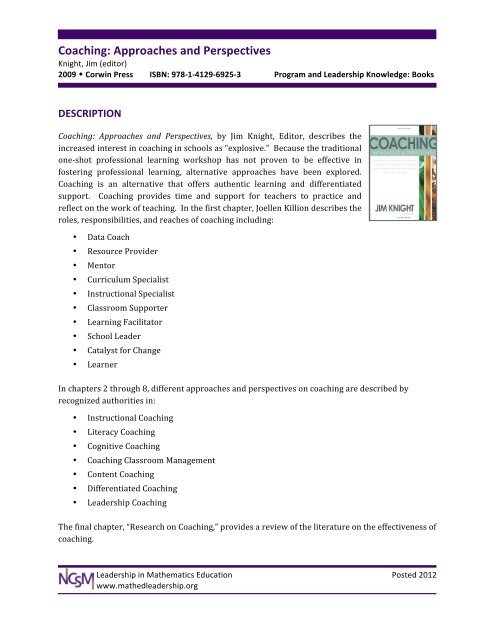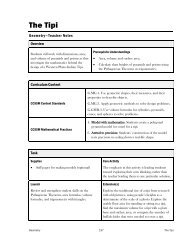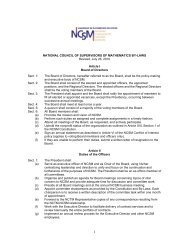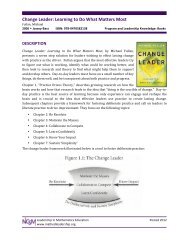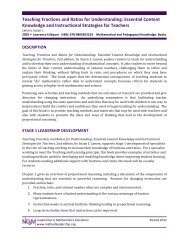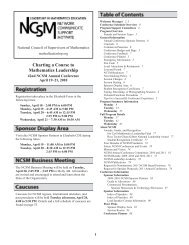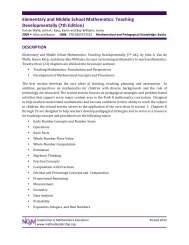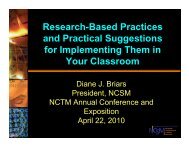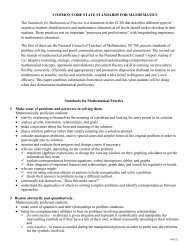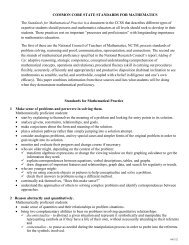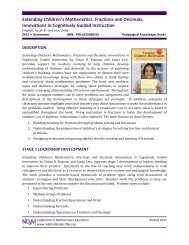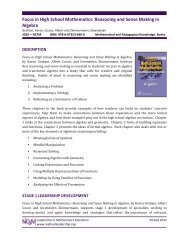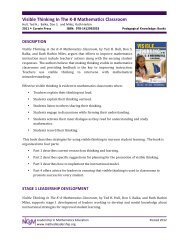Coaching: Approaches and Perspectives
Coaching: Approaches and Perspectives
Coaching: Approaches and Perspectives
Create successful ePaper yourself
Turn your PDF publications into a flip-book with our unique Google optimized e-Paper software.
<strong>Coaching</strong>: <strong>Approaches</strong> <strong>and</strong> <strong>Perspectives</strong> <br />
Knight, Jim (editor) <br />
2009 w Corwin Press ISBN: 978-‐1-‐4129-‐6925-‐3 Program <strong>and</strong> Leadership Knowledge: Books <br />
DESCRIPTION <br />
<strong>Coaching</strong>: <strong>Approaches</strong> <strong>and</strong> <strong>Perspectives</strong>, by Jim Knight, Editor, describes the <br />
increased interest in coaching in schools as “explosive.” Because the traditional <br />
one-‐shot professional learning workshop has not proven to be effective in <br />
fostering professional learning, alternative approaches have been explored. <br />
<strong>Coaching</strong> is an alternative that offers authentic learning <strong>and</strong> differentiated <br />
support. <strong>Coaching</strong> provides time <strong>and</strong> support for teachers to practice <strong>and</strong> <br />
reflect on the work of teaching. In the first chapter, Joellen Killion describes the <br />
roles, responsibilities, <strong>and</strong> reaches of coaching including: <br />
• Data Coach <br />
• Resource Provider <br />
• Mentor <br />
• Curriculum Specialist <br />
• Instructional Specialist <br />
• Classroom Supporter <br />
• Learning Facilitator <br />
• School Leader <br />
• Catalyst for Change <br />
• Learner <br />
In chapters 2 through 8, different approaches <strong>and</strong> perspectives on coaching are described by <br />
recognized authorities in: <br />
• Instructional <strong>Coaching</strong> <br />
• Literacy <strong>Coaching</strong> <br />
• Cognitive <strong>Coaching</strong> <br />
• <strong>Coaching</strong> Classroom Management <br />
• Content <strong>Coaching</strong> <br />
• Differentiated <strong>Coaching</strong> <br />
• Leadership <strong>Coaching</strong> <br />
The final chapter, “Research on <strong>Coaching</strong>,” provides a review of the literature on the effectiveness of <br />
coaching.<br />
Leadership in Mathematics Education <br />
www.mathedleadership.org <br />
Posted 2012
STAGE 3 LEADERSHIP DEVELOPMENT <br />
<strong>Coaching</strong>: <strong>Approaches</strong> <strong>and</strong> <strong>Perspectives</strong>, by Jim Knight, Editor, supports stage 3 development of <br />
leaders working to advocate for <strong>and</strong> ensure a systemic implementation of a professional learning <br />
community. A group of specialists working in a professional learning community to explore the <br />
roles <strong>and</strong> responsibilities of coaching will find this book to be a valuable resource. <br />
A good starting place might be to read <strong>and</strong> reflect on chapter 1 from Joellen Killion that answers the <br />
simple question: What roles do specialists hold in schools Specialists might discuss the roles <strong>and</strong> <br />
responsibilities from the chapter <strong>and</strong> make connections to their own work. In addition to reflecting <br />
on the 10 roles described here, specialists will benefit from a discussion of the distinction between <br />
coaching heavy <strong>and</strong> coaching light. <br />
Chapter 9 provides a great deal of information on research about coaching that is worth discussing <br />
with colleagues. Four approaches to coaching most frequently mentioned in the literature, peer <br />
coaching, cognitive coaching, literacy coaching, <strong>and</strong> instructional coaching, are discussed using <br />
information from research conducted using each of the four coaching models. Expert groups might <br />
share a description of the model <strong>and</strong> highlights of the research results. <br />
The remaining chapters provide information on various approaches to coaching from recognized <br />
experts in the field <strong>and</strong> provide opportunities for specialists to make more informed choices about <br />
a range of coaching approaches to best serve the needs of the teachers <strong>and</strong> schools they serve. <br />
Leadership in Mathematics Education <br />
www.mathedleadership.org <br />
Posted 2012


